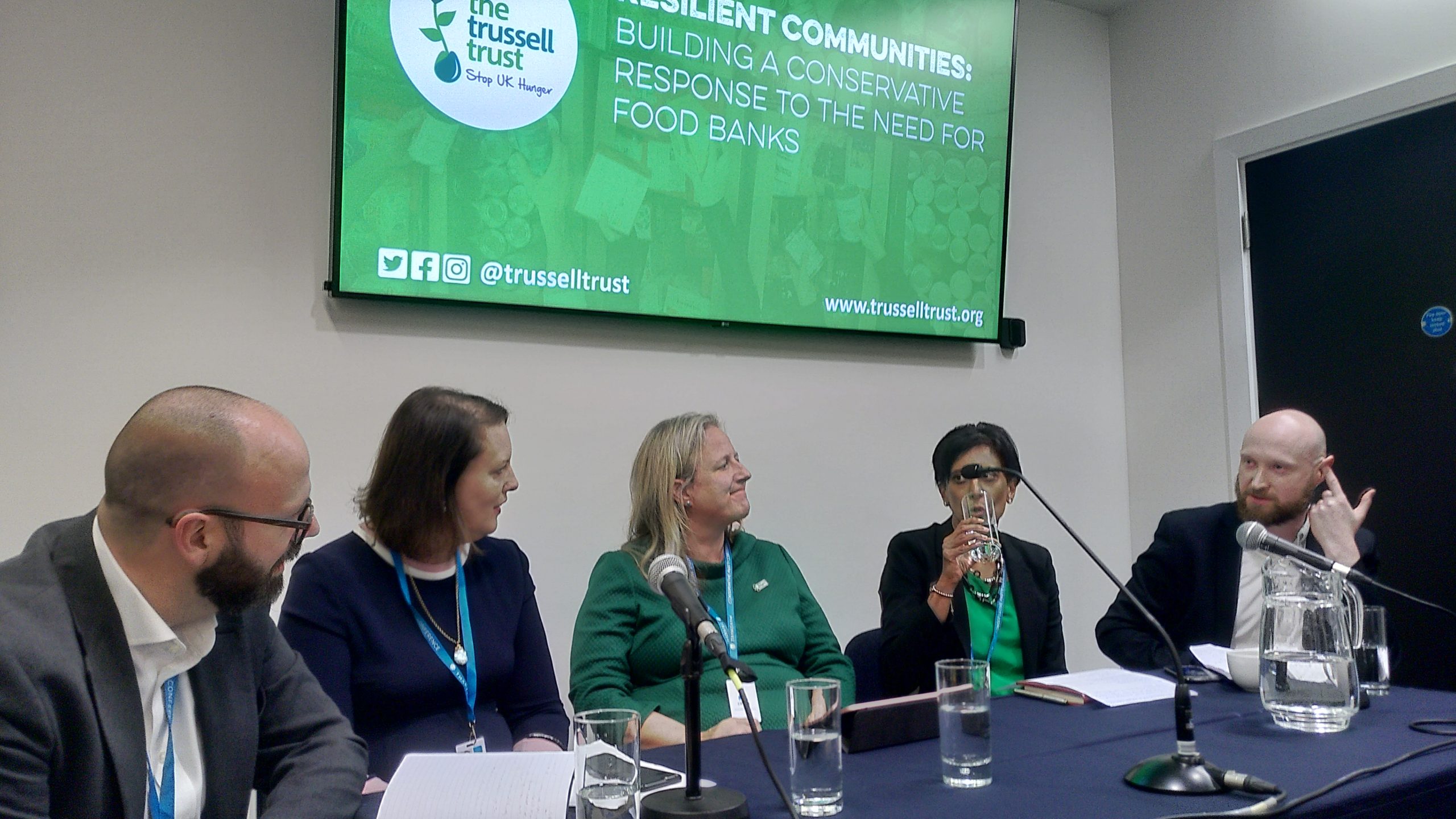By Sumi Rabindrakumar, Head of Policy & Research
Party conferences are usually full of slogans; at the Trussell Trust, we try to push political parties to put some meaning behind them. This year, at Labour and Conservative party conferences, we discussed how we can end the need for food banks, drawing on frontline experience from experts in our network, lessons from the pandemic, and insight across levels of government. After another record number of emergency food parcels provided across the UK (a shocking 2.5 million in our network), we urgently need action.
Hopeful signs and policy solutions were offered across the political parties
Reflecting on the events we held and attended, there are reasons to hope that – across the political spectrum – people are starting to listen and come together to press for the changes needed so people no longer have to turn to charity to put food on the table.
We heard powerful testimony from Jenni, who had received support from a food bank in our network, who urged MPs to understand the difficulties of managing on such a low budget. And we heard from Jack Monroe of the grind of acute poverty, its long-term effects and the vital importance of recognising the reality of people’s living situations.
“I can’t impress upon you enough the value of being seen and heard as a human being when you are practically invisible.”
Jack Monroe
Party members, councillors and MPs across the political parties voiced deep concern about the reality of not being able to afford the essentials like food, heating, and housing, and recognised that mass distribution of charitable food is no long-term solution.
“We must tackle this horrendous inequality”
Conservative councillor
Politicians and policy experts discussed practical steps forward. Some focused on a strong social security system, including investing in Universal Credit (“an unfinished project”, argued one Conservative MP), increasing Local Housing Allowance covering private rent, long-term funding for local welfare, ensuring affordable and fair collection of debts to local and central government (from council tax to tax credit overpayments) and improving access to support for people with no recourse to public funds.
Others focused on tackling the longer-term drivers of need for food banks, including building social housing, and addressing precarious work. There was widespread recognition of the importance of both local solutions driven by the knowledge of communities, as well as strong, national systems of support to ensure people have enough in their pockets to afford the essentials.
Progress is undermined by this week’s decision to abandon people on the lowest incomes
Yet at the same time, 6 million households receiving Universal Credit or Working Tax Credit are being dealt a crushing blow, as they begin to have £20 removed from their weekly budget. That’s £20 less a week on food, heating, clothes, school uniforms, and toiletries. £20 less a week as we head into a spiralling cost of living crisis.
The bubble of hope from the engagement we saw from party members, backbenchers and frontbenchers across the political parties was swiftly burst by statements from the Chancellor and the Prime Minister, apparently forgetting the vital role of social security during the pandemic.
I was struck by an event on social housing this Tuesday. The common theme across the speakers was how long they had been talking about solutions to deliver more social housing, and affordable social rent. This is the reality faced by households on the lowest incomes: social security that has steadily been cut, without any alternative solution to afford the essentials. Food banks have picked up the pieces, but this isn’t right.
Why should people on the lowest incomes pay for the political failure to deal with problems like unaffordable housing and low wages? How long should people be forced to survive on social security that has been pared to the bone, while they wait for new promises of change to take effect? And what does the Chancellor’s rejection of social security investment say for people who need extra support to live a dignified life – because they are taking on unpaid care for the previous or next generation; because they lose their job; because they fall ill; because they have a long-term health condition which means they may never be in paid work?
Still time to act
The Chancellor said last week that “everyone should be able to afford the essentials”. The Prime Minister said yesterday that he would “promote opportunity with every tool we have”. If these slogans are to have any meaning, the Chancellor must change course in his upcoming Spending Review and make the increase to Universal Credit and Working Tax Credit permanent. We cannot hope to unleash people’s potential if we are pushing them into deep poverty at the same time.
The government saw the living standards emergency that the Covid-19 pandemic would unleash and took action. As Matt Stallard, chair of trustees for Manchester Central Foodbank asked on our panel, why isn’t the continued hunger and destitution in our communities also an emergency? Surely it is, and surely we must act. A first step would be to keep the £20 a week lifeline.



